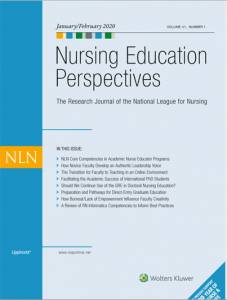Barbara Patterson will lead publication dedicated to promoting nursing research and education
By Allie Shinskey
University of Rhode Island College of Nursing alumnus Barbara Patterson has expanded her role in nursing research and education, having recently been named editor of the NLN Journal, Nursing Education Perspectives.
Patterson, a graduate of the College’s Ph.D. in Nursing Science program, takes the helm of the Washington D.C.-based National League of Nursing journal after having served as editor of the research brief section of the NLN journal or about five years. In her new position, Patterson will be better able to promote NLN’s mission to promote excellence in nursing education and research.
“My role there is to provide leadership for the center in terms of promoting NLN’s mission and position related to nursing education,” Patterson said, adding she will now have increased responsibility for “setting the tone and direction of the journal,” promoting nursing research projects, scholar programs, books, publications and faculty development.
 Promoting excellence in nursing education is the mission of the NLN, which aims to “build a strong and diverse nursing workforce to advance the health of our nation and the global community,” the league’s website states. “The NLN offers professional development, networking opportunities, testing services, nursing research grants, and public policy initiatives to its 40,000 individual and 1,200 institutional members.”
Promoting excellence in nursing education is the mission of the NLN, which aims to “build a strong and diverse nursing workforce to advance the health of our nation and the global community,” the league’s website states. “The NLN offers professional development, networking opportunities, testing services, nursing research grants, and public policy initiatives to its 40,000 individual and 1,200 institutional members.”
The NLN’s four core values include caring, integrity, diversity and excellence. One of its specific goals is to “promote research that generates evidence about nursing education and the scholarship of teaching,” which is the reason the NLN journal was established.
The journal, officially named Nursing Education Perspectives and established in 1980, describes itself as “The Premier Nurse Education Journal for Scholarship in Nursing Education.” It is released bi-monthly and includes peer-reviewed articles related to issues such as research and innovation regarding teaching and learning, curricula, technology and more. The journal is a resource for NLN members, which include nursing faculty members, deans and directors of nursing education programs, and researchers.
Patterson graduated from URI’s Ph.D. nursing science program in 1992, just a few years after the doctoral program started. She was particularly excited that URI’s program focused more on nursing theory at a time when other programs did not. URI’s program gave Patterson an important skillset, she said, which included being able to “truly, critically examine the literature and build an argument for why we should be doing something or why we shouldn’t be doing something, and to be able to look at both sides of an argument. The skillset of the development of theory and testing of theory has remained with me.”
Other skills Patterson said she learned in the program included qualitative and quantitative research skills, the ability to write well, and overall, the confidence and mentorship she needed to become a professional scholar in nursing.
Patterson said she hopes to help make the journal more internationally recognized and apply what she has learned to help truly make an impact on nursing education through her new role.
“From the perspective of being an editor of a journal, I think my goal is to facilitate and continue to disseminate really robust high-quality research,” Patterson said. “The challenge is how we teach in that we teach with current best practices, and ‘best practice’ is always changing. My impact, as I would say, is to be producing and disseminating high-quality research that directs our teaching practice.”
Allie Shinskey is a sophomore journalism major and intern with the URI Academic Health Collaborative.

